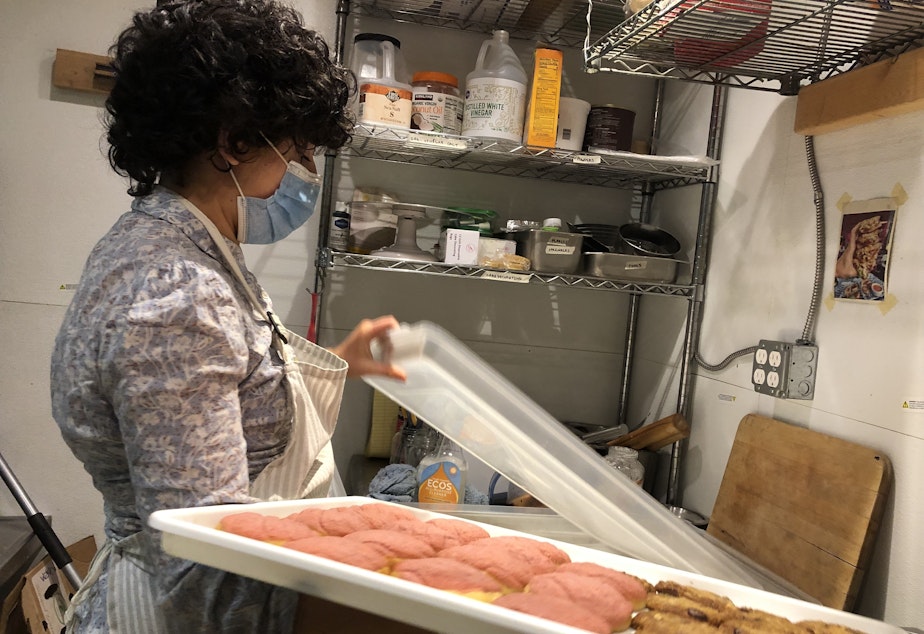This Seattle bakery sells vegan treats and funds mutual aid efforts

Lara de la Rosa packs up baked goods to transport to the bakery a few blocks away.
CREDIT: KUOW PHOTO/RUBY DE LUNA
BY Ruby de Luna
JAN 26, 2022 a
The pandemic caused many people to do a lot of soul searching, leading some to make life-changing decisions. One Seattle biochemist quit her lab job to follow her baking passion.
An industrial sized mixer is rattling as it whips up chickpea water that will turn into meringue. Once fluffed up, it’ll be piped on top of the citrus tarts that are waiting on the counter.
While the meringue whisks, Lara de la Rosa is boxing up the cookies, conchas, and other goodies. She recently opened Lazy Cow Bakery in Seattle’s Fremont neighborhood, featuring vegan baked goods. She and fellow baker Phoebe Katz have been up working in a rented commercial kitchen since early morning.
“I’m getting all these cuts and burns,” de la Rosa said, with a laugh. “So I’m becoming a real chef.”
De la Rosa is 23- years-old and has no professional baking experience. She was working at a University of Washington lab earning a steady paycheck. When the pandemic hit, her lab hours were drastically scaled back. The downtime made her realize she didn’t want to keep doing that job anymore. The protests for racial justice and political upheaval in 2020 also made her question her life's purpose.
“I wanted to do something more in line with activism,” she explained. “There is activism that you can kind of do within biochemistry, but I really wasn’t interested in that. I kind of wanted to work more directly with the community.”
De la Rosa had always enjoyed baking. She’s also been vegan since her teens, and noticed a big void when it comes to plant-based sweets and pastries. So she started to bake and posted her creations on Instagram. The orders started coming in.
What started as a hobby became a vehicle for social justice, she said. In addition to Lazy Cow, she started a mutual aid organization called Casa del Xolo, focused on the needs of the Latino community. For now, there’s a community fridge and a food pantry inside Lazy Cow, funded using proceeds from the bakery. Others have also begun to donate non-perishable foods for the pantry.
“Charity is often given by more privileged group to a less privileged group. Whereas mutual aid is people that are often part of the same community that they’re helping,” de la Rosa said.
Lazy Cow is part of growing number of small businesses that are trying to do good while selling services and stuff.
Deliberate spending
Laura Clise is CEO of Intentionalist, an online guide that helps consumers who want to support businesses that align with their values. She says many small businesses have historically supported their local communities even though they weren’t founded as a social enterprise. But there’s been a shift in attitudes and expectations.
“I think increasingly, we live in a world where especially younger generations are acutely aware of where we’re falling short, and want to do something about it," Clise said.
And it’s not just small businesses. Clise says consumers have valued shopping local, and supporting immigrant or women-owned businesses for decades. But in recent years they’ve become more aware, or they want to know the stories behind their local businesses. And the numbers bear that out.
“If we look at the numbers for Small Business Saturday 2021, consumers spent $23.3 billion in a single day, which was an 18% increase compared to the amount spent in 2020,” Clise said.
Clise notes that more people have been using the Intentionalist’s website as well, another indication of their desire to be more deliberate about their spending.
“The reality is that the decisions that we make about where we spend our money and what we purchase shapes the world around us.”
Clise says it’s easy to take that connection for granted. But over the past two years, we learned and saw what happened when shop windows in our communities went dark.

At Lazy Cow Bakery, de la Rosa unpacks the boxes of pastries and desserts. She assembles a sample plate that will go into the pastry case. She starts a pot of coffee and tidies up the counter before the bakery opens. Behind her, a curtain covers up the kitchen which is still under construction. There are so many things to stay on top of that she doesn’t have time to dwell on the anxieties of starting a small business.
“If I’m being honest, I don’t — I can’t — even think it will fail. I don’t even entertain the idea in my mind. Because I really don’t have an alternative to this. De la Rosa says what’s been challenging about opening a business is living with it day in and day out.
“I’ve talked to other business owners,” said de la Rosa. “I’m like, I’m baking in my dreams! I cannot turn my brain off and I don’t know what to do about it!”
De la Rosa Will be at the bakery until closing. Then she’ll head back to the commercial kitchen for the night shift and bake.
No comments:
Post a Comment